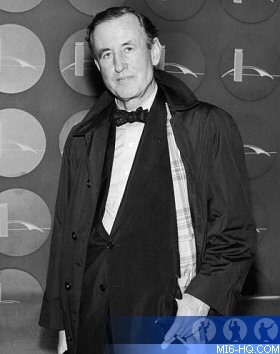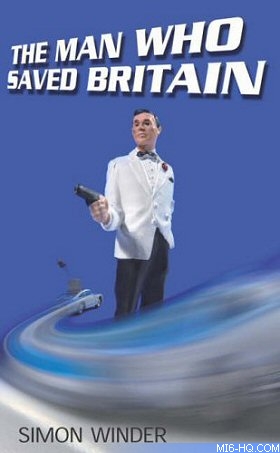 |
| |
MI6 went behind the scenes of the radio documentary
"James Bond, The Last Englishman" aired during the
Ian Fleming centenary...
|
|
Behind "James Bond, The Last Englishman"
22nd February 2009
Aired on BBC Radio 4 on Monday 26th May 2008 - the week that
celebrated the Ian Fleming
centenary - "James Bond, The Last
Englishman" explored
the
historical context of James Bond in the Britain of the 1950s
and 1960s and
afterwards.
Professor
David Cannadine argued that the novels are a 'consoling fantasy'
at that moment when Britain had lost an Empire but not yet found
a role in the world; that Bond appealed because he flew in the
face of British decline. He was a patriotic, handsome, savvy
action man, a winner, to whom even the Americans deferred. One
Englishman could make a difference, even affect history, in a
way his country no longer could. For Cannadine, Bond is the consolatory
fantasy of Fleming, the nostalgic conservative appalled by Britain's
collapse as a great power.
MI6 caught up with the
programme's producer Susan Marling to delve behind the
scenes of the radio production...
How did you end up working on the
programme – The
Last Englishman?
Essentially, that came about because I had worked on a
number of different programmes with David Cannadine. In
a book that David wrote called “In
Churchill’s Shadow” there’s a very, very expansive and excellent
essay about James Bond – or rather more particularly about Ian Fleming
and the Ian Fleming novels. David told me actually he was ill in bed once when
he read all the books whilst recovering, and the essay was the result of that
reading.
So, we quite often make programmes together about something
he’s
interested in at the time or has written about. On this occasion, obviously,
with the Fleming Centenary coming up it seemed like a good time to do this
one.
| |

|
Can you describe some of the aspects of
Cannadine’s essay
that are reflected in the radio production?
Very much the theme of his essay is the idea that runs right through the programme,
which is that the Bond novels – the first of which published in the coronation
year – were closely tied in lots of ways, to what was happening in Contemporary
Britain. In lots of ways, Bond’s power and character, his success and the
fact that he can literally be the saviour of the Free World was popular with
readers, exactly at a moment when Britain is loosing its power in the world.
In lots of ways, the books were rather consoling fantasies for people whom perhaps,
wanted at the time to escape the realities of Britain’s decline.
Did you personally learn anything new about Ian Fleming, his
world or his characters?
Yes! Absolutely I did. I had a very hazy
idea about Ian Fleming, I knew about him mostly because of his
wife, Anne Fleming – Anne
Rothermere as she was – they were in the early ‘50s
late ‘60s a sort of fashionable couple. Probably fairly
dislikeable, in a way. They belonged to that old fashioned class,
where snobbery came as part of the territory. I’d seen
little bits of archive footage of Fleming, and he exactly fitted
that image. The fact that he spent a lot of time in Jamaica,
enjoying a late colonial lifestyle only he seemed to confirm
that.
But, through making the programme, what I didn’t realised
about him – and this is also confirmed by the very good
exhibition at the Imperial War Museum – was just what an
interesting man he was. In a sense, his wartime work and the
fact that quite a lot of that work with Naval Intelligence played
directly into the invention of Bond stories.
I was quite interested in some of the escapades which he obviously
helped dream up, including one that was a scheme for retrieving
from a German gun-boat a code book which might be useful at Bletchley.
That is exactly the sort of daring-do, which would later find
its way into the James Bond books.
So, I didn’t realise he had had such an interesting war
as it were and the fact that he was also a very competent journalist
helped my opinion of him. That is something that almost went
side-by-side with his early writing days, before Bond took over.
I think the books themselves perhaps show that kind of observation.
I don’t think the books are great literature. I think they
do show great journalistic ability for summing things up very
well and using just enough observed detail to make a very convincing
story and a sense of place.
How did you research and build the programme - and what did
the research entail?
I had two staring points really. The first
starting point was, well, because it’s a radio programme, the availability
of good archive material. So I wanted good archive material of
Fleming’s. I also wanted, without any sort use of any very
expensive copyright, to use little clips from the films – and
trailers from the films.
|

|
|
To a certain extent, radio programmes
are not big budget enterprises. So secondly, I was slightly
circumscribed
by what was going to be available to me. That was fine,
I was in a way able to make a virtue out of that.
Then
there were certain people I wanted to interview: Andrew
Lycett, his biographer. Also, a man I think that
has written a book that is very interesting, in terms of
David’s argument, about the place of James Bond in
post-war Britain and that was Simon Winder, who wrote a
book called “James
Bond: The Man Who Saved Britain”.
So, that was a major interview for me. Together with that
archive we wanted a little bit of on-location stuff, so
we actually went to the exhibition from where David introduces
the programme.
There are all sorts of other things I would
have liked to included but couldn’t. It’s only
a half-an-hour programme and in lots of ways we had to
stick to David’s thesis. That became the narrative
spine of the programme. So it has a sort of chronological
process but it is all illustrating David Cannadine’s
main point – that is to do with Bond’s place
in a Britain. |
What are your feelings about Simon Winder’s
work and thesis?
That
book is very personal, which is why I like it. It’s
got great authority, but he also very much brings into the book,
a personal account of James Bond – the films especially – and
being a teenager and being so intrigued by it. It’s almost
his own life story being told in parallel with the Bond films
as they came out. Of course, bringing it right up to date with
the intriguing portrayal of Bond by Daniel
Craig.
How much support did you receive from Ian Fleming Publications?
We
contacted the foundation and indeed at the opening of the For
Your Eyes Only exhibition, we were very kindly offered an
interview with Kate Grimond, who is Ian Fleming’s niece.
It was just unfortunate that because of the stringencies of time,
that I wasn’t able to use the interview in the programme.
In a longer programme we would have liked to done that. They
knew David Cannadine and were very supportive of the programme
and what we were trying to do.
Were there any other materials that were not included, but you
might have wished the programme had time for?
One
of the things we tried to do, was to marry – something
you can do more on radio than perhaps you can do on television – some
of the written extracts, with little snippets from the films.
There is a section for example where we talk about violence,
or somebody
falling into a pool of sharks, or at a gaming table.
We had both the actuality from the film but also the readings.
We tried to meld the novels and the films together a bit. We
would have perhaps liked to do a bit more of this creatively
but we had time for what we had, and as I say, David’s
remained the central argument.
Can you tell us a little about working with and interviewing
Andrew Lycett and his take on the programme?
Well, Andrew was
very generous with his time, and once again we had a great deal
of material from him that we weren’t
able to include. He was very good on the wartime experiences
in particular and of course knows the Fleming life in great detail.
While that was tremendously useful, sometimes you use an interview
as much for your own guidance as it is in the end for broadcast.
So, while the bits of Andrew we used were vital to the programme,
it was in a way a shame we couldn’t use more.
Want do you think fans took away from the
program?
I hope
that it links together for people, a fictional character but
the reality of the post-war world in Britain. I don’t
think many people realise or remembered that the first novels
came out incredibly early – when rationing was still part
of reality in Britain – which is why James Bond’s
extravagant, gastronomic habits must have seemed so very luxurious
to people. He was having things, eating things, enjoying woman,
in a way that was almost totally closed to a lot of people in
the 1950’s. So I think that because we know the films in
a lot of ways, much better than we know the books, we don’t
relate the world of James Bond with what was actually happening
in Britain and I think that’s the major connection we wanted
people to make.
Thanks to Susan Marling, Just Radio, and BBC
Radio 4.